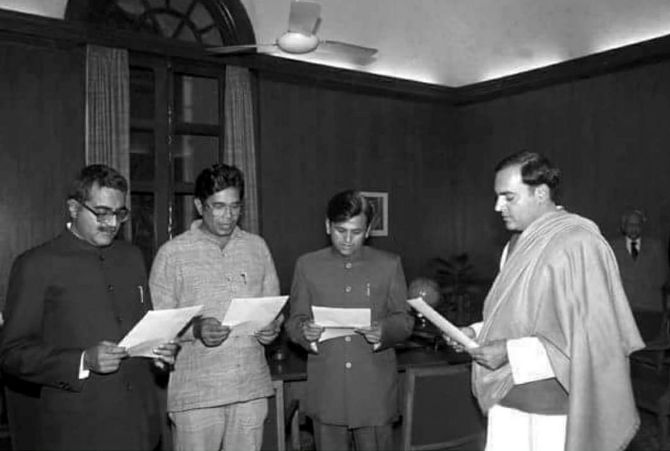Ahmed Patel's closeness to the Gandhi family was undeniable.
But unlike others, he resisted the temptation to use it to leverage personal business, says Aditi Phadnis.

Ahmed Patel, treasurer of the Indian National Congress, MP, a close aide to former prime minister Rajiv Gandhi and Congress President Sonia Gandhi, has died at 71. He leaves behind a void that no one can fill.
This may sound like a cliché. But there are few in the party today who are capable of being a bridge over troubled waters that Patel proved to be, time and again.
Ahmed Patel was just 30 when he became an MP in 1977. The Congress had been wiped out elsewhere but Gujarat had saved the day, sending a handful of MPs to the Lok Sabha.
He was elected from his native Bharuch district, a region that still swears by him though it may not elect him anymore (the BJP has retained four out of five assembly seats in the parliamentary constituency for the last two decades).
When Indira Gandhi was assassinated and Rajiv came to power in 1984 with a 400-plus majority in the Lok Sabha, Patel, who had built a connect with Rajiv when the former PM was nothing more than a party general secretary, was promoted rapidly as party apparatchik.
By 1986, Gandhi had formalised his plan to replace older Congress leaders with his boys. Patel was sent back to Gujarat as the president of the party unit in the state.
Then Rajiv was assassinated and most of his supporters shifted allegiance to P V Narasimha Rao. Patel, however, had lost the Lok Sabha election as well as the party position in Gujarat. He had no house in Delhi, no patron, nothing.
His friend Najma Heptulla had arranged guest accommodation for him in Meena Bagh. But he was served a notice to vacate in three days time, at a time when his son and daughter both were taking board exams. And this by a government that was headed by a Congress prime minister!
From then on, Patel resolved he would neither seek nor accept anything from the Rao government.
What he did accept, however, was the secretaryship of the Jawahar Bhavan Trust, a project initiated by Rajiv, visualised as a think-tank for the Congress, but pushed in real earnest by Sonia Gandhi in the years after his assassination.
The Rajiv Gandhi Foundation, housed in the Jawahar Bhavan premises, was offered -- in the first budget presented by then finance minister Manmohan Singh -- an outlay of Rs 20 crore which Sonia Gandhi turned down. It was Patel who worked tirelessly to raise money and drove contractors and others to finish the project.
The appointment, as can be imagined, gave him a unique opportunity denied to other Congressmen -- access to Sonia Gandhi.
Despite this position, Patel was lonely in the years that followed -- mitigated only by the vast network he had created as a result of holding so many party posts, his personal popularity and his understanding of the Congress structure.
This was demonstrated most clearly during the party conference in Tirupati in 1993 where after years, elections were held to the Congress Working Committee. He got the third highest number of votes, presumably a result of past favours.
The period from 1996 to 2000 was a period of great instability in the Congress. In 1999, Jitendra Prasada, for a while political advisor to Narasimha Rao, decided to take on Sonia Gandhi for the party presidentship. The outcome was a no-brainer.
Once she became president of the party, Sonia Gandhi appointed Ahmad Patel her political advisor.
Patel's closeness to the Gandhi family was undeniable. But unlike others, he resisted the temptation to use it to leverage personal business.
Those who have seen him in action say he could raise Rs 30 crore in Gujarat in 30 minutes by making a few phone calls.
Reporters have been witness to sackfuls of currency notes going through his office to 'facilitate' this or that election. He turned down all offers of ministerships, opting to stay an organisation man.
There are only two occasions when corruption charges were voiced against him: And he announced that if they were proved he would quit politics.
One was by former Mizoram governor Swaraj Kaushal some decades ago; and the other, more recently, was his role in funding an operation to secure the support of some BJP MPs to get them to quit their party and vote in favour of the United Progressive Alliance after the Left parties pulled out support.
Patel was exonerated by a parliamentary committee that went into the incident.
The Narendra Modi government in its second phase, tried to embroil Patel's family in money laundering and Enforcement Directorate enquiries. Till he fell ill, Patel was confident that nothing would come out of it all. No other member of his family is in politics.
He was personally a man of austere habits, not one to wine and dine or have kabab and biryani parties to win friends and influence people.
Patel was not a particularly prosperous man. His money belonged to his wife whose family were local zamindars in Bharuch.
It was he who encouraged the chemical industry development at Ankleshwar and especially the Jamnagar refinery, something that brought him extremely close to the Ambani family, both father Dhirubhai and son Mukesh.
When Rahul took over, it was generally assumed that the organisation would be overhauled. But while seniors like Janardan Dwivedi were edged out, Patel was retained. He was the organic link between the Sonia Congress and the Rahul Congress.
With his death, the Congress is poorer -- in more ways than one.











